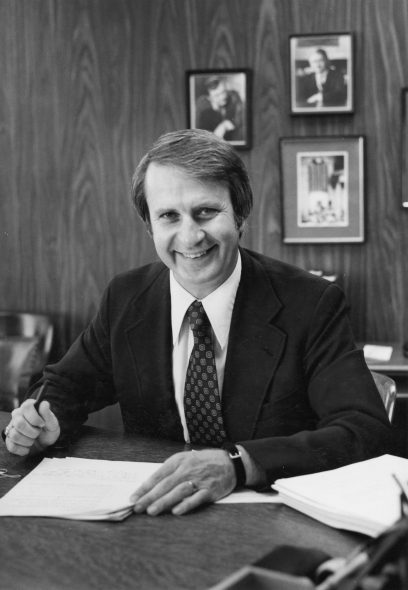The Legacy of Tony Earl
The Democratic governor believed that 'good policy is good politics,' and proceeded accordingly.

Department of Natural Resources Secretary Anthony (Tony) Earl seated at desk. Feb., 1980. Photo from UW-Digitized Collections. (CC BY-ND 4.0)
Tony Earl believed that “good policy is good politics,” a proposition for which there is scant evidence.
When Earl became Governor of Wisconsin in January, 1983 the state faced a budget deficit north of a billion dollars, a big number even today and huge in the context of that time. And that was just the start. The state was deep in the Reagan recession, unemployment was high, the farm crisis was in full swing and the long decline in manufacturing was just beginning. And it wasn’t just the general state budget that was in the red, but also the unemployment compensation program and the transportation fund.
When Earl ran for office the previous fall he was forthright about what he would do to fix the problems. He would need to raise taxes. He’d make a temporary increase in the sales tax permanent and he would impose a temporary income tax surcharge. Arguing that the income tax was the only tax based on the ability to pay, he said that it was the fairest way out of a tough spot. He also proclaimed that he intended not to just patch the leak but to fix the problems for the long-term.
Four years later not only had Earl fixed the budget problems, but the state was running a modest surplus, the UC and transportation funds were back in the black and Earl moved to repeal his temporary income tax surcharge ahead of schedule. The public rewarded him by showing him the door. He lost to Tommy Thompson in 1986 and it wasn’t that close.
How is that possible? How does a man who, four years earlier, had received every newspaper endorsement in the state, had won 40 out of 72 counties and defeated his opponent by an overwhelming margin, lose in the next election?
The answer is complicated. Even Earl himself in a Wisconsin Legislative Reference Bureau oral history interview said it was a combination of things, but that his tax increases weren’t the main culprit. As he put it, “it was probably more about the social issues.”
Earl piled up those social issues from day one. Even before taking office he appointed Doris Hanson to be the first woman to run the powerful Department of Administration. He appointed Howard Fuller, a Black intellectual and activist, to be Employment Relations Secretary, and he famously appointed Ron McCrea to be his press secretary. The Milwaukee Sentinel welcomed McCrea with a headline that read, “Earl Appoints Avowed Homosexual.”
These were good deeds that would not go unpunished. Within six months of taking office, one of the most personable and popular politicians in state history had stunningly bad approval numbers. He never recovered.
Those who worked most closely with him repeat the same story. They would point out the political perils of some progressive policy he wanted to pursue and he’d say, “But God damn it, it’s the right thing to do!” And then, despite the sound advice, he’d do it anyway.
It wasn’t that Earl didn’t understand the political risks. He understood them perfectly well but he took them anyway, believing that good policy really would, in the last analysis, be good politics. He believed that people would “be sore at me” for awhile, but they would eventually see that he was doing the right thing and they’d reward him for it. They didn’t. He tried again, running for the Senate in 1988, but was defeated by Herb Kohl in the primary. He never ran for office again.
Tony Earl died Thursday at the age of 86. He never lost faith that for every public problem there was a right thing to do. And, moreover, he could explain why it was the right thing to a public that would listen and that would eventually — and even if they didn’t like it — understand.
Most politicians desperately want us to believe in them. But Tony Earl believed in us, in our capacity to know when it was time to make hard choices, in our basic decency and in our ability to put aside prejudices. And he remained optimistic, though not naive, until the end. Everything had been, another of his favorite words, “grand.” If we broke his heart he didn’t let on.
Dave Cieslewicz is a Madison and Upper Peninsula based writer. He served as mayor of Madison from 2003 to 2011. More of his writing can be found at Yellow Stripes & Dead Armadillos.
Op-Ed
-
Unlocking Milwaukee’s Potential Through Smart Zoning Reform
 Jul 5th, 2024 by Ariam Kesete
Jul 5th, 2024 by Ariam Kesete
-
We Energies’ Natural Gas Plans Are A Mistake
 Jun 28th, 2024 by John Imes
Jun 28th, 2024 by John Imes
-
Milwaukee Needs New Kind of School Board
 Jun 26th, 2024 by Jordan Morales
Jun 26th, 2024 by Jordan Morales





















Thank you Tony for your service and your belief in good politics.